#footprint
Plastic Pollution: How can you make a difference?
By TCI Ambassador & Intern Kaylin Datwyler
With an ever increasing population on Earth, the demand for easy to produce materials has skyrocketed. Plastic is one of the most commonly seen items in every department store you go to. We have based our livelihoods around plastic; almost all of the sectors use plastic in some way. From using it as a method of packaging to ensuring we are able to stay healthy (vaccines), plastic has become something we rely on.
As I have grown older in a time in which everything is at your fingertip, it has been more accessible for me to see the effects plastic pollution has had on our marine life. You do not need to be at the beach to see the damage plastic has done to our marine life.
 | 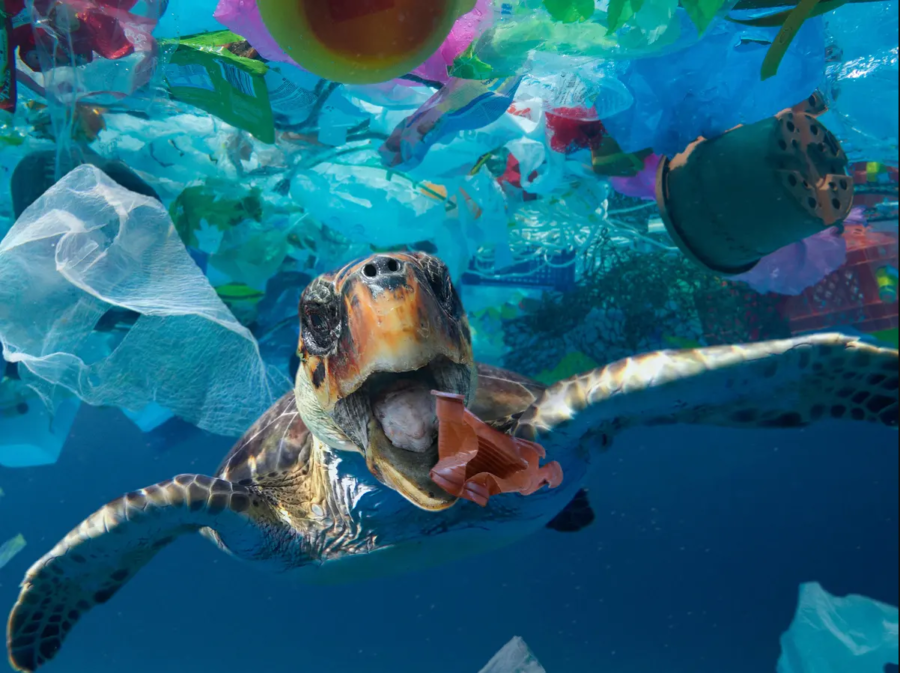 |
I love our oceans, ever since I was a child I adored going to the beach and creating sandcastles that were bigger than myself while also simultaneously running away from the seagulls, since at the time I believed they were bigger than me. The beach is a place that I can escape to and feel alive; I also have the ability to leave, while others are not so lucky. Marine ecosystems depend on the ocean in order to survive, it is their home there is no other place for them to go.
As we come to produce more and more plastic, we are further damaging our oceans in the process. Plastic encompasses our daily lives, especially single-use plastics. On average, an American uses and throws away about 110 pounds (50 kg) of single-use plastic every year. Plastic is not made to decompose, once it is brought to the landfill it will not decompose until 450 years later or more. That is, if the plastic even makes it to the landfill; majority of plastics either from littering or water runoff from rain will reach the ocean where it will either float on the surface or slowly sink to the bottom of the ocean.
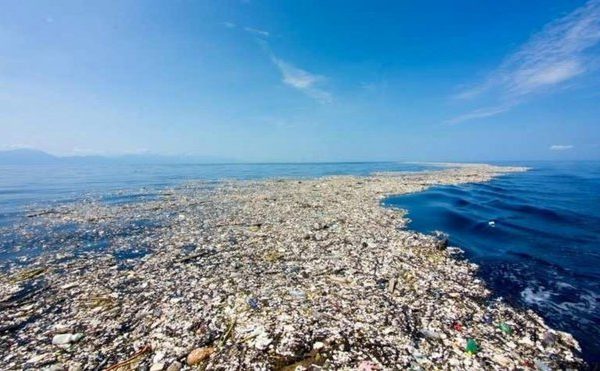 | 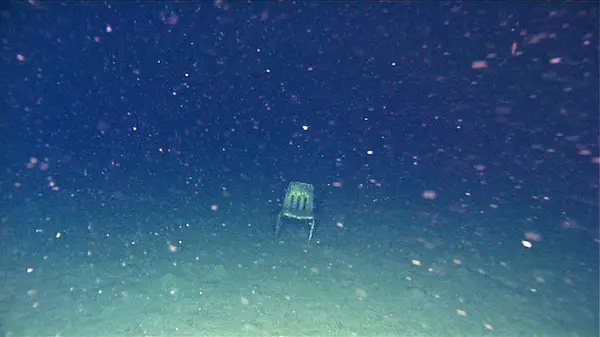 |
Once the plastic is in the ocean, it becomes a threat to all marine life.
Plastic Pollution Effects on Marine Life:
- Toxification
- Behavioral disorder
- Starvation
- Suffocation
This problem not only affects marine life, it also affects humans. Microplastics are created as plastic slowly starts to deteriorate within the ocean, it can be easily swallowed by many commercial fish that people eat on a daily basis. They also can penetrate the skin and can be inhaled as well.
Outlook on Plastic Pollution:
- The United Nations stated that 85% of all marine litter is plastic
- By 2040 there will be up to 23-37 metric tons of plastic in our oceans
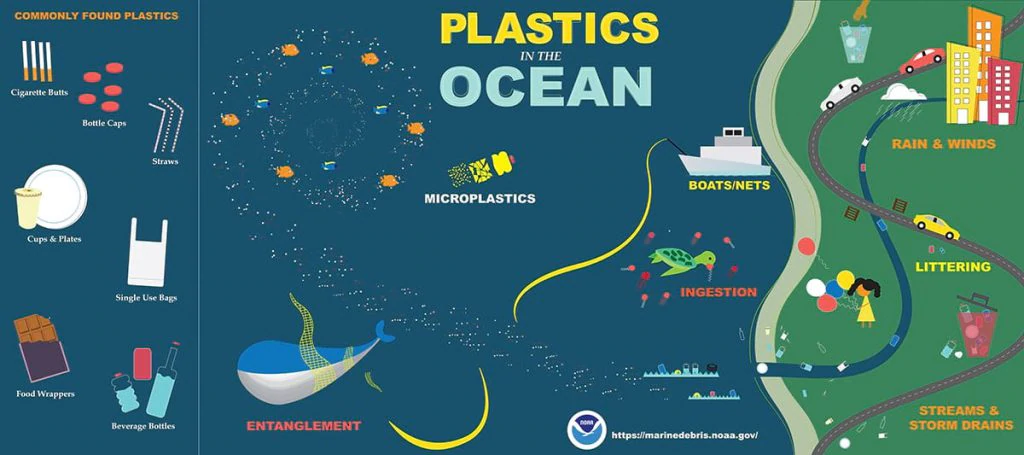
There are many ways that you can help make a difference in your community. From purchasing more sustainable options to talking to local legislators, there are plenty of ways to help. Beach cleanups are also another great way to get involved and are really easy to host and/or be apart of.
Hosting a Beach Cleanup
To host a beach cleanup, all you need is a group of like minded people and some gloves and trash bags and if you feel like it some trash picker-uppers. I hosted my own Beach Cleanup with the help of The Climate Initiative and it was one of the most inspiring experiences I have ever had. Where I am located, in the beautiful Bay Area in sunny California, a lot of the beaches are already well kept. So when my group and I went to Baker Beach we mainly found microplastics and a few odd items (orange peels, acrylic nail, a shirt and pants). However, one beach does not speak for all the beaches in the world, we may not have found large pieces of trash but we had found tons of microplastics. Every action you take counts, no matter the size.
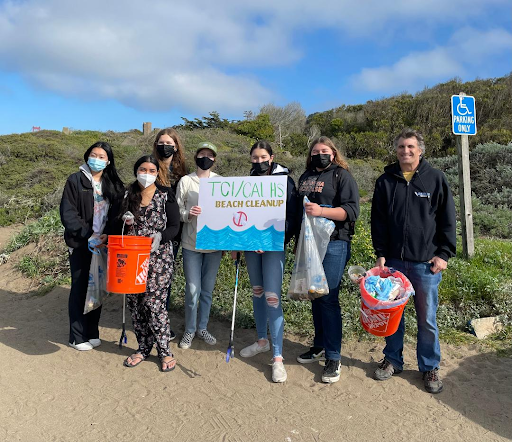 | 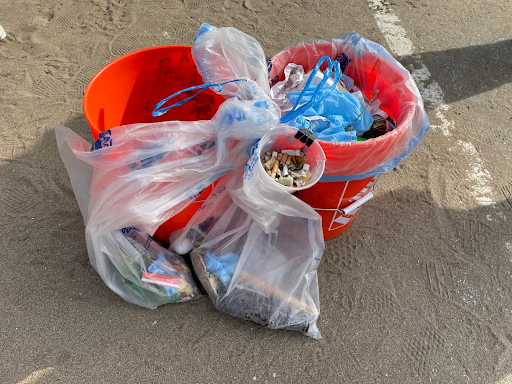 |
Beach Cleanups are the starting point to helping save our oceans. At the beach cleanup I hosted, we discussed the three main focuses: ecological, economical, and sociocultural and the impacts each of these has due to plastic pollution. This brought our focus outside of just the beach we were at, and to how plastic pollution would affect our world. It helped us gain perspective on what our world is facing in the future if we don’t tackle this problem now.
From an ecological perspective, the signs can be clearly seen wherever you go in our oceans. Plastic affects every single marine organism; some more than others due to ingestion of that plastic. Once there is enough plastic in these organisms they slowly die from starvation. Due to plastic pollution it is commonly found among all marine animals that they have lacerations, infections, a reduced ability to swim, as well as internal injuries. The dangers of plastic pollution may also affect marine life in a different way. Plastic is a great transport for invasive species to move to a new ecosystem where they can severely damage that ecosystem.
Economically speaking, our global economy would be spending between 6-19 billion dollars on projects to clean up our ocean. It would cost less money to attack this problem now than wait for more problems to arise in the future. By 2040, it is estimated that companies will be spending upwards of $100 billion due to financial risk from waste management costs, which could lead to a rise in illegal domestic and international waste disposal. This problem is fixable, if we decide together that it is worth spending the money now rather than later.
Lastly, the sociocultural impacts that will be caused due to plastic pollution affect a great number of people. Plastic pollution not only impacts fisheries that depend on those fish for their livelihoods, but also on marginalized groups. In a UN report, they claim that women have a higher risk of being affected by plastic pollution based on exposure at home and also through feminine care products. This can lead to miscarriages as well as cancer, if this problem is not addressed. This is only one example, there are so many ways that plastic pollution affects people’s lives on a daily basis.
Finally, you do not need to live by a beach to help your community. If there is a creek, lake, trail, or even a street that you go by or have heard of, that is a great place to host a cleanup. Through my internship at TCI, I have not only been able to host a beach cleanup but also a trail cleanup in my own community. There are so many ways to get involved, however it is solely up to you to figure out how you want to make a difference. I have gained so much knowledge while interning at TCI and it has transformed my passion for our oceans into one that I can take action upon and be apart of the solution.
If you are interested, check out A Guide to Plastic in the Ocean by NOAA or checkout the UN News for up to date articles on our environmental situation.
If you want to check out the Ambassador ToolKit that I used for my beach cleanup, checkout this link: Communications Activities – The Climate Initiative
About the Author
Hi, I’m Kaylin Datwyler. I am a current senior living in the Bay Area of beautiful California. I spend my free time hanging out with my friends and family, going on spontaneous adventures, and my personal favorite snuggling up and reading one of my books. I have always been really passionate about our oceans and marine life, however it was not until recently that I have took action for my passion. Through TCI, I have had so many opportunities that I have only ever dreamed about. This has truly been one of the best experiences of my life, and I would highly recommend becoming a youth ambassador, it is worth it!
